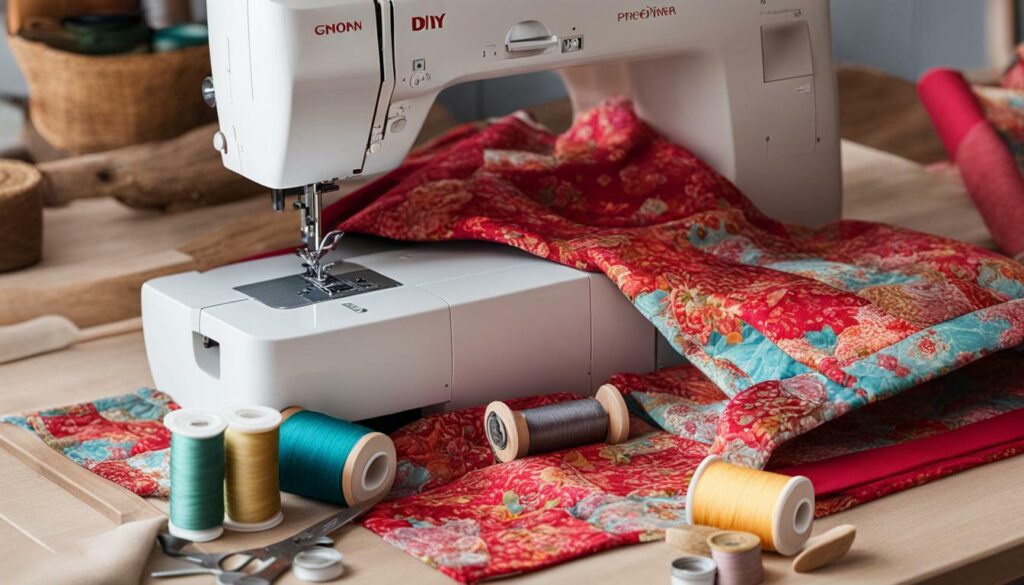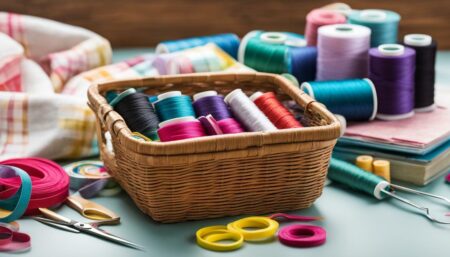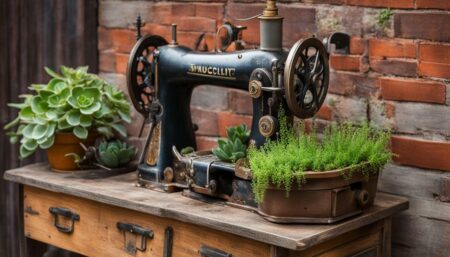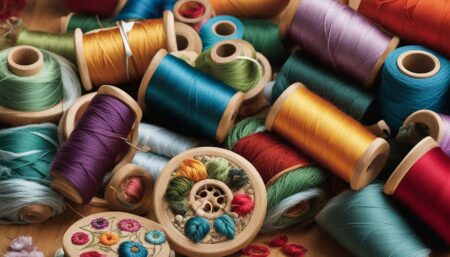Whether you’re a beginner or an experienced seamstress, having the right tools is essential for creating beautiful, professional-looking sewing projects. From a sewing machine to specialized tools like fabric scissors and thimbles, each tool plays a vital role in achieving the perfect finish. In this article, we’ll explore the essential sewing tools every crafter should have in their arsenal.
Let’s dive in and discover the must-have sewing tools for your next project.
Key Takeaways:
- Having the right sewing tools is essential for creating professional-looking projects.
- The top essential sewing tools include a sewing machine, fabric scissors, measuring tape, and more.
- Investing in quality sewing tools makes a huge difference in achieving the perfect finish.
- Make sure to have these essential sewing tools in your collection for your next sewing adventure.
The Importance of a Sewing Machine
A sewing machine is an essential tool for any sewing enthusiast. It allows you to stitch fabric precisely and quickly, saving you time and effort. Without a sewing machine, many projects would be impossible to complete or would take much longer to finish.
Investing in a high-quality sewing machine is crucial for achieving professional-looking results. There are many factors to consider when choosing a sewing machine, such as the type of projects you plan to sew, your skill level, and your budget.
Modern sewing machines come with a variety of features, such as automatic threading, adjustable stitch length and width, and different types of stitches. Some machines also have special functions, like embroidery and quilting capabilities.
Whether you are a beginner or an experienced sewer, having a sewing machine as part of your essential sewing tools kit can help take your projects to the next level.
When it comes to sewing, not all needles are created equal. There are different types of sewing needles, each designed for specific purposes. Using the right needle will ensure that your stitches are secure and even.
For general-purpose sewing, you can use a universal needle. However, if you’re sewing on specific fabric types, such as denim or leather, it’s best to use needles made specifically for those materials. The same goes for machine needles – different types of sewing machines require different needle sizes and types.
Another important factor to consider is the needle size. The size of the needle you choose will depend on the weight and type of fabric you’re sewing. For example, thinner fabrics require smaller needles, while thicker fabrics require larger needles.
Always make sure to have a variety of needles on hand in your sewing kit. This is an essential part of any sewing project and will help you achieve professional-looking results.
Fabric scissors are a key tool for any sewing project, allowing you to cut through various fabrics with precision and ease. It’s important to choose a quality pair of fabric scissors that will give you a clean and precise cut every time.
When selecting fabric scissors, look for a pair with sharp blades that can cut through multiple layers of fabric without fraying or damaging it. Choose a pair with a comfortable handle, as you’ll be using them for extended periods of time.
It’s also important to keep your fabric scissors separate from other scissors in your home, as they can dull or damage the blades. Use a protective case or store them in a safe place to ensure they stay sharp and last for years to come.
Investing in a good pair of fabric scissors is well worth the cost, as it will save you time and effort in cutting out your fabric. With a quality pair of scissors, you’ll achieve a professional-looking finish in your sewing projects.
Measuring Tape for Accurate Sewing
Accurate measurements are crucial in sewing projects. A measuring tape allows you to measure and mark fabric accurately, ensuring that your garments fit perfectly. Make sure to have a flexible measuring tape in your essential sewing tools kit.
When measuring, make sure to pull the tape snugly, but not too tight, to get an accurate measurement. Measure twice to ensure that your measurements are correct before cutting into your fabric.
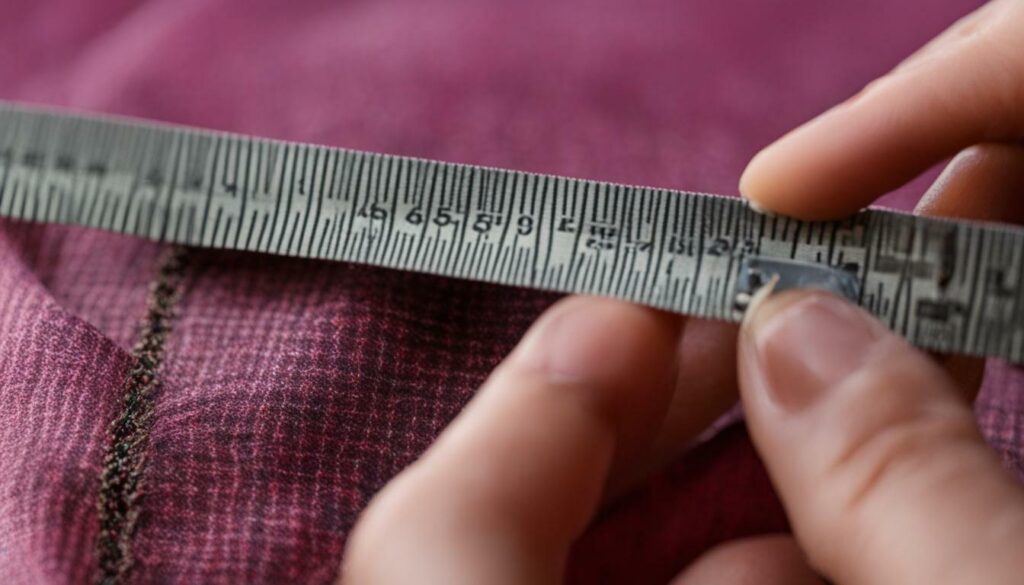
Having a measuring tape that is easily accessible is also important. You can attach it to a ribbon or elastic and wear it around your neck while sewing. This way, you won’t have to search for it every time you need to take a measurement.
Seam Ripper for Fixes and Corrections
Even the most experienced seamstresses make mistakes, but with a seam ripper, fixing errors is easy. Seam rippers are essential sewing tools that allow you to undo stitches and correct mistakes without damaging the fabric.
When using a seam ripper, gently cut the stitches, being careful not to cut the fabric. Then, remove the unwanted threads and re-stitch the area. Seam rippers come in different sizes and styles, so choose the one that works best for you.
Having a seam ripper in your sewing kit ensures that mistakes won’t ruin your project. So, make sure to include this essential tool in your collection.
Keeping your fingers safe while sewing is crucial, especially when working with thicker fabrics or doing delicate hand stitching. That’s where a thimble comes in handy. It provides an extra layer of protection for your fingers and allows you to apply more pressure when pushing the needle through the fabric.
Thimbles come in different sizes and materials, so choose the one that works best for you. Some have a ridge on the top for better grip, while others have a dimpled surface for better control. Experiment with different styles to find the one that feels most comfortable for you.
Don’t forget to add a thimble to your essential sewing tools collection. It’s a small investment that can make a big difference in your sewing experience!
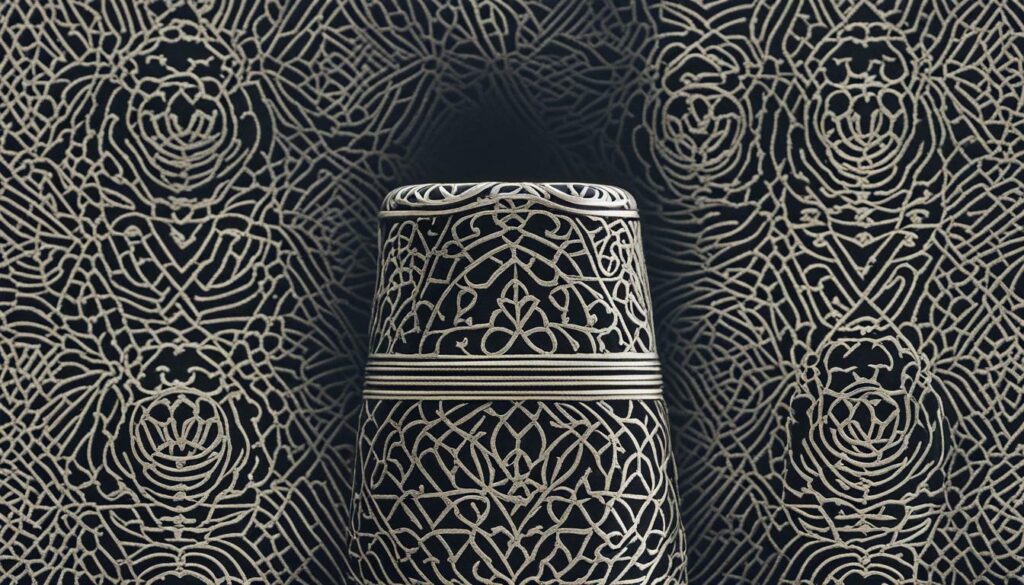
Make sure to store your thimble in a safe place, such as a pin cushion or the pocket of your sewing machine case, so it doesn’t get lost or damaged.
Pin Cushion for Easy Access
A pin cushion may seem like a small and insignificant item, but it’s an essential sewing tool that can save you time and frustration.
Pin cushions keep your pins and needles organized and accessible. You won’t waste time searching for a needle when you need it or accidentally drop one on the floor. With a pin cushion, all your pins are in one place, ready to use.
Pin cushions come in various shapes and sizes, from classic tomato-shaped to whimsical animal designs. Choose the one that best fits your personal style and work preferences. You can even make your own custom pin cushion using scraps of fabric and filling materials.
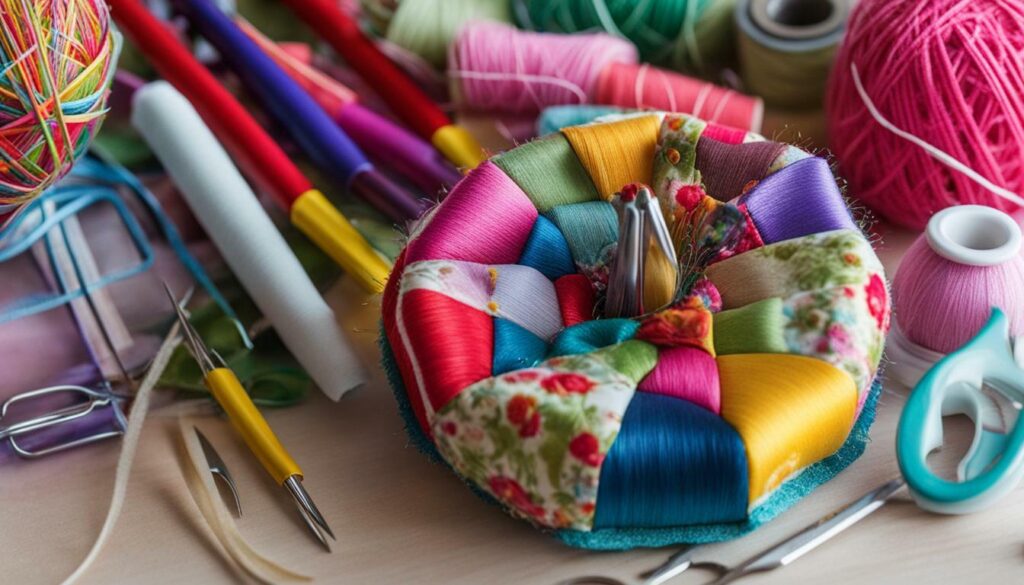
The Importance of Pressing Your Seams with an Iron
Proper pressing is a crucial step in sewing that can make all the difference in achieving professional-looking results. An iron is a necessary tool for pressing seams flat, removing wrinkles, and creating crisp edges. When choosing an iron, look for one with adjustable heat settings to suit the type of fabric you’re working with.
Be sure to press your fabric before cutting to ensure accurate measurements. During the sewing process, press each seam as you sew to keep them flat and prevent them from puckering. Finally, give your finished project a thorough press for a polished and professional look.
| Top Tips for Ironing |
|---|
| Use a press cloth: Protect delicate fabrics from scorching or leaving shiny marks by using a clean cloth between the iron and the fabric. |
| Iron on the wrong side: For fabrics that show watermarks or often get shiny, iron on the wrong side to prevent damage. |
| Press the seams open: For a flat and polished finish, press the seams open. |
Remember to clean your iron regularly to remove any buildup that could transfer onto your fabric. A clean iron ensures that your fabric remains in pristine condition.
Having a good-quality iron is an essential part of any sewing kit, and it is one of the crucial tools you should invest in. Ensure it is always ready and accessible for your sewing projects, and you’ll have professional-looking garments every time.
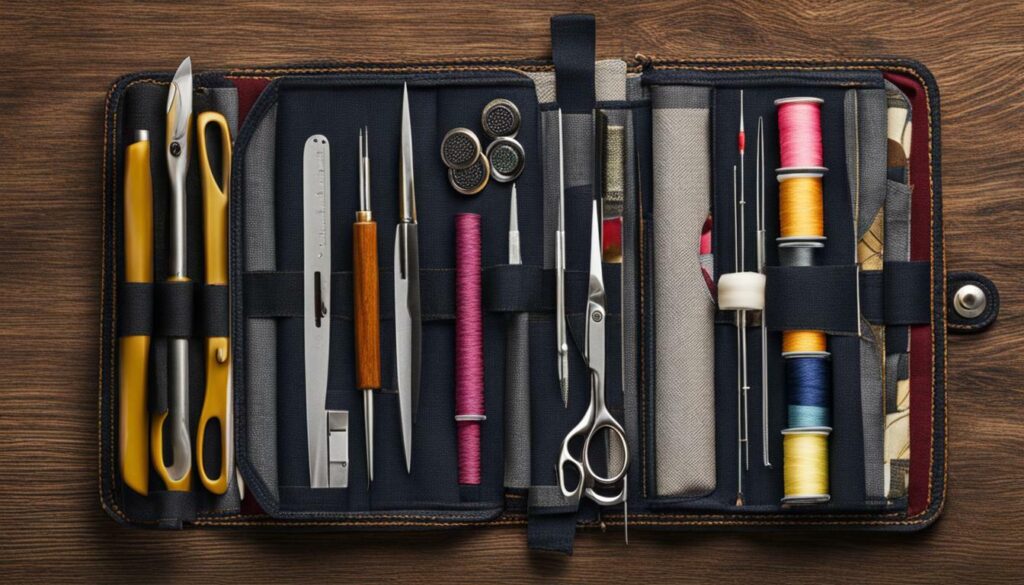
When it comes to sewing, using the right thread is just as important as having the proper tools. High-quality sewing thread ensures that your stitches are strong and durable, preventing your projects from falling apart over time.
There are many types of thread to choose from, including polyester, cotton, silk, and nylon. Each type of thread has its unique properties, such as strength, colorfastness, and sheen. Make sure to choose a thread that is appropriate for your fabric type and weight.
Another important consideration when selecting thread is its weight. Thread weight refers to the thickness of the thread, with the lighter weight being thinner than the heavier weight. Using the appropriate thread weight ensures that your stitches are even and not too bulky for the fabric.
Finally, consider the color of the thread. Choosing a thread that matches your fabric color closely ensures that your stitches blend in seamlessly and do not detract from the overall appearance of your project.
Investing in high-quality sewing thread is an essential part of any sewing project. It may be tempting to use low-quality thread to save a few dollars, but using the wrong thread can compromise the integrity of your stitches and ultimately ruin your project. Choose the right thread for your project, and you’ll be rewarded with a professional-looking finished product.
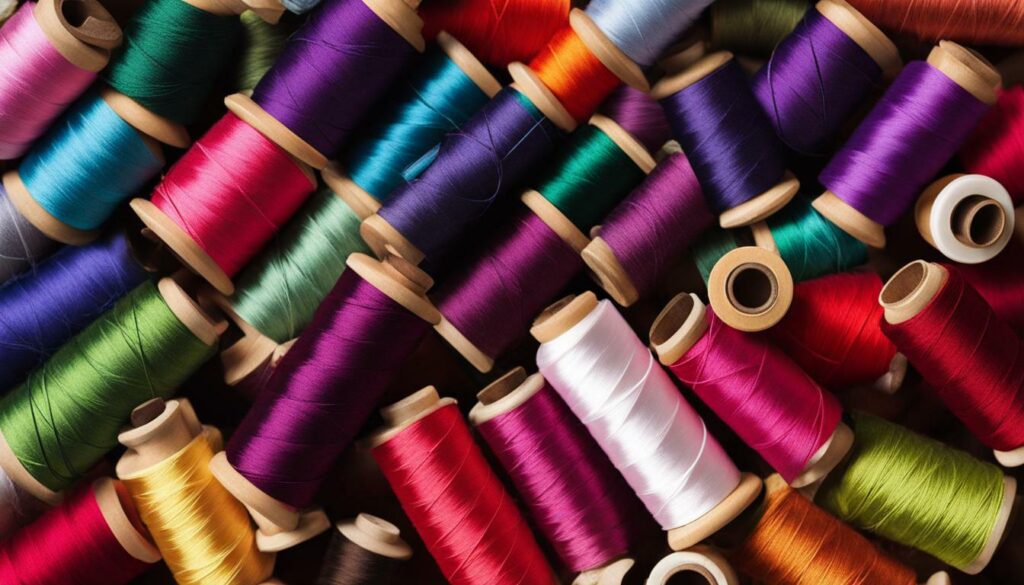
Make sure to stock up on a variety of thread colors and weights to accommodate various projects. With the right sewing thread, you can create beautiful, long-lasting pieces that you’ll be proud of.
Conclusion
Having the essential sewing tools in your collection will elevate your sewing projects and make them more enjoyable. From a sewing machine to specialized tools like fabric scissors and thimbles, each tool plays a vital role in achieving professional-looking results.
Invest in quality tools and make sure to have them on hand for your next sewing adventure. Happy sewing!
FAQ
What are the essential sewing tools every crafter should have?
Every crafter should have essential sewing tools: a sewing machine, sewing needles, fabric scissors, measuring tape, seam ripper, thimble, pin cushion, iron, and sewing thread.
Why is a sewing machine important?
A sewing machine is important because it allows you to stitch fabric precisely and quickly, saving you time and effort in your sewing projects.
How do I choose the right sewing needles?
Choosing the right sewing needles involves understanding the different types and sizes available. Different needles are designed for specific purposes, so selecting the appropriate needle ensures secure and even stitches.
Why do I need fabric scissors?
Fabric scissors are designed with sharp blades to cut through various fabrics without fraying or damaging them. Investing in a good pair of fabric scissors will ensure clean and precise edges in your sewing projects.
What is the importance of a measuring tape in sewing?
Accurate measurements are crucial in sewing projects to ensure a proper fit. A measuring tape allows you to measure and mark fabric accurately, ensuring your garments turn out perfectly.
Why do I need a seam ripper?
A seam ripper is a handy tool for undoing stitches and correcting mistakes in your sewing projects. It allows you to easily remove unwanted stitches without damaging the fabric.
Why should I use a thimble?
A thimble protects your fingers and provides better control while sewing, especially when working with thick fabrics or delicate hand stitching.
What is the purpose of a pin cushion?
A pin cushion helps keep your pins and needles organized and easily accessible. It prevents them from getting lost in fabric or on the sewing table, ensuring you can quickly grab the right pin for your project.
Why is an iron important in sewing?
An iron is important in sewing as it helps press seams flat, remove wrinkles, and create crisp edges for professional-looking results in your sewing projects.
How does sewing thread impact my stitches?
Using high-quality sewing thread is essential for durable and long-lasting stitches. Choose the right thread weight and color that matches your fabric to ensure a professional finish.



